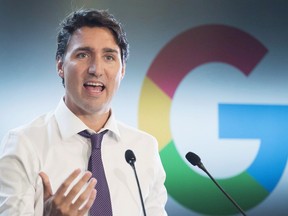Hundreds of tech leaders and entrepreneurs joined the Shopify founder in post-budget dismay this week, signing an open letter decrying the tax changes
Article content
At a conference hosted by Canadian tech giant Shopify in 2018, Prime Minister Justin Trudeau took a moment to marvel at the unlikely success of two men who started out as snowboarders.
Trudeau, the former snowboarding instructor, was sharing the stage with Shopify founder Tobias Lütke, whose multi-billion dollar company had its beginnings as an online snowboard shop.
Advertisement 2
Article content
Article content
As they chuckled at their humble beginnings, the two snowboarders agreed that Canada had all the raw materials for a vibrant, entrepreneurial economy if it could only just get out of its own way and, Trudeau said, show “a little more swagger.”
Trudeau’s vision hasn’t changed much: he still mostly describes Canada’s problem with investment and business growth as one of perception more than substance. But his relationship with Canada’s high-tech leaders has been straining in recent years. What were simmering frustrations came to a boil this week after the government promised to collect more taxes on capital gains income.
Recommended from Editorial
“Message from a friend: ‘Canada has heard rumours about innovation and is determined to leave no stone unturned in deterring it’,” Lütke tweeted.
Hundreds of tech leaders and entrepreneurs joined the Shopify founder in post-budget dismay this week, signing an open letter decrying the tax changes. Tech entrepreneurs rely heavily on capital gains as their primary incentive to build successful companies.
Article content
Advertisement 3
Article content
In the panel discussion with Trudeau in 2018, Lütke expressed his admiration for Canada’s immigrant-friendly multiculturalism. He’s written about his concerns about climate change and even tried to harness the power of his company to fight it. In a blog post, the German-born founder described himself as a “liberally minded immigrant, leading a predominantly liberal workforce.”
In short, Lütke should be the platonic ideal of a Liberal voter, except for the increasing alarm he has expressed recently on his Twitter timeline about the state of the country.
It’s emblematic of Trudeau’s current struggles, with polls showing younger voters fleeing his party, mostly to the opposition Conservatives. And almost everyone is telling pollsters that the country is in shambles.
A recent Postmedia-Leger poll found even 43 per cent of Liberals agreeing that it “feels like everything is broken in this country right now.” Fifty-nine per cent of Canadians are angry about how the country is being managed.
This week, Canadians learned that many of our most prominent high-tech leaders are part of that seething majority.
Advertisement 4
Article content
Trudeau’s problems with Big Tech aren’t new, though. His government’s Bill C-18 resulted in Meta blocking news on Canadian Facebook feeds. Trudeau also battled with Google over the same bill, in a marked shift from the early days of his government when the Liberals saw tech giants as kindred spirits, pushing boundaries and changing the world for the better. He’s also imposed digital service taxes and old-fashioned Canadian content rules on streaming platforms. And, with his online harms bill, he’s moving to censor all manner of unsavoury content, and plans to hold social media companies accountable for policing it.
Until now, ire for the Trudeau government has mostly come from global tech companies, which have become political punching bags across the western world. This is the first time that Canadian tech leaders have so openly taken aim at Trudeau.
The spark that lit the bonfire was the government’s decision to increase the amount of capital gains income that is taxable. The government normally taxes 50 per cent of capital gains profits but, starting in June, it will levy taxes on two-thirds of it for income over $250,000.
Advertisement 5
Article content
Politically, the government has been describing the tax increase as a way to get the ultra rich to “pay their fair share,” which it hopes will appeal to those gen-Z and millennial voters who have been fleeing the Liberal party in droves.
Political strategists are split on the likelihood of this approach paying off. Conservative strategist Nick Kouvalis argues that young people are aspirational, so even if the tax changes don’t directly affect them, they will be annoyed at a tax on their future success. Liberal strategist Dan Arnold on the other hand think that every day the government spends debating capital gains taxes instead of the carbon tax is a win for Trudeau.
Whether this was a deliberate decision to achieve tax fairness, though, is up for debate. University of Calgary economist Trevor Tombe applauded the move in theory, for better levelling the way the government treats earned income (which is all subject to tax) and capital gains (which, for legitimate reasons, are only partly subject to tax). But he complained that the government hadn’t complemented the change with a productivity-boosting tax cut somewhere else, such as on personal income taxes.
Advertisement 6
Article content
The government didn’t do that, because it needs the new tax revenue to pay for social programs promised to the NDP (pharmacare, school lunches, dental care) to keep its minority government alive.
The government hopes its messaging will put them on the right side of a class war, even as it infuriates the tech world. But tech founders aren’t quite the sinister Monopoly men that political parties usually evoke when they want to rage against the rich, especially in Canada where there are few tech giants. They look a lot more like Lütke — liberally minded, possibly immigrant, leading predominantly liberal workforces.
And as opposition to the budget keeps piling up, the government is no doubt discovering it could have used some friends with ideas about how to grow the economy.
This is an excerpt from National Post’s exclusive Political Hack newsletter. Get more political coverage and insight like this in your inbox as Ottawa bureau chief Stuart Thomson and political analyst Tasha Kheiriddin get at what’s really going on behind the scenes on Parliament Hill every Wednesday and Friday. We’re currently offering it free to subscribers only. Sign up here.
National Post
stthomson@postmedia.com
Our website is the place for the latest breaking news, exclusive scoops, longreads and provocative commentary. Please bookmark nationalpost.com and sign up for our politics newsletter, First Reading, here.
Article content









